My Newborn Farts a Lot. Should I Be Concerned?
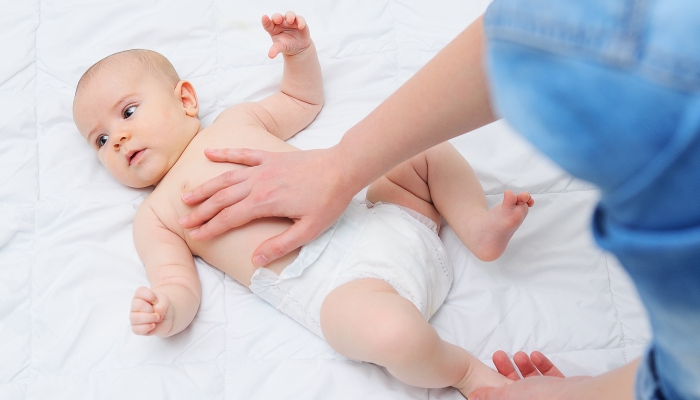
- It’s normal for newborns to have a lot of gas.
- Babies usually have the most gas between 6 weeks and 4 months old.
- Excess gas may be caused by swallowing too much air or lactose intolerance.
- Frequent burping and dietary changes can help with excessive farting.
Becoming a new parent can make you more acutely aware of our bodies and all of their functions. Between changing diapers, cleaning spit-up, breastfeeding, and dealing with your ever-changing postpartum body, life with a newborn can put a magnifying glass on otherwise private topics.
One thing you may notice as a new parent is that your baby farts a lot. While adults might be embarrassed by a noisy digestive system, it’s completely normal and totally healthy for humans to pass gas. While a baby’s farts are nothing to be embarrassed about, excessive farting or crying while passing gas may indicate a problem.
As a new parent, you may wonder if you should be concerned that your newborn farts a lot. While it’s perfectly normal for a newborn to be gassy, there are some things you can do to help and some things to look out for.
My Newborn Farts a Lot: Is This Normal?
A baby’s digestive system has a lot of adjustments to make when they enter the world. A baby’s tummy has to get used to eating new food like breastmilk or formula in addition to all of the other new things they learn.
It’s normal for newborns to fart a lot. As long as they seem comfortable and seem to pass gas easily, you shouldn’t need to worry about baby gas. Excessive gas is most common when your baby is around six weeks old. Your baby’s gas should start to taper off around 12 weeks of age.

How Many Times Per Day Do Newborns Normally Fart?
As a baby’s digestive tract develops, they may need to release intestinal gas more than 20 times per day. While this may sound like a lot, it is not much different than healthy adults, who pass gas between 14 and 21 times each day.
What Causes Excessive Gas in Babies?
While it’s normal if your baby farts a lot, pay close attention if your baby cries just before passing gas or if they seem to be passing more gas than normal. There are several reasons that your baby may produce gas more than normal.
Bottle Feeding
While bottle feeding a baby doesn’t guarantee that they will have excess gas, bottle-fed babies may eat faster than breastfed babies, which puts them at risk for swallowing more air bubbles.
If your baby farts a lot after a bottle feeding, you may want to switch to a vented bottle or an air-free bottle. Air bubbles are a risk when bottle feeding both formula or breast milk.
Poor Latch
If your breastfed baby seems to have too much gas, it could be because of a poor latch. As a baby sucks at the breast, a poor latch may cause them to swallow air and fart excessively, especially after your baby eats.
Cow’s Milk Allergy or Lactose Intolerance
Lactose intolerance or cow’s milk allergy can both be reasons that your baby farts a lot.
Milk allergy is the most common type of food allergy in children under the age of three, and can cause gas, nausea, hives, itching, and even anaphylaxis, a life-threatening condition. Fortunately, about 75% of children outgrow their allergy to milk protein.
Lactose intolerance means a person is missing the enzyme lactase, and their body is unable to digest the sugar in milk. This may make your baby gassy or give them diarrhea.
Food Sensitivity
As your baby transitions to solid foods, their digestive system may struggle switching from breast milk or formula milk to certain foods. High fiber foods and cruciferous vegetables like broccoli may be hard on your baby’s digestion at first.
Unless your baby has a milk protein allergy, it’s highly unlikely that the food you eat will give your baby gas through your breast milk. While the foods a mother eats can change the flavor of their breast milk, certain foods do not usually cause extra gas in most babies.
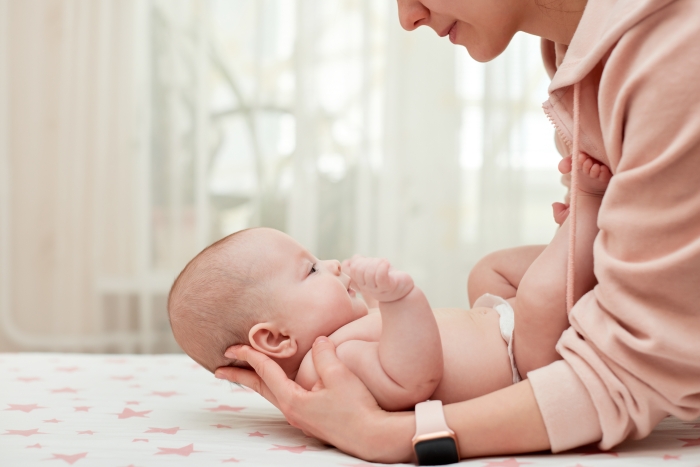
How to Help Your Gassy Baby Feel Better
Gas doesn’t usually cause problems, but if your gassy baby seems uncomfortable, there are a few tips you can try to get rid of baby gas fast.
Frequent Burping
If you notice that your baby farts excessively, try helping them get rid of trapped gas by burping them more frequently. Hold your baby upright and gently pat them on the back to break up small gas bubbles that get trapped in their belly.
Burp your baby at least once at the end of each feeding. Gassy babies may need to take breaks to be burped multiple times per feeding.
Change in Breastfeeding Mother’s Diet
If your breastfed baby has excessive gas, it’s worth trying to eliminate dairy from your diet to find out whether your baby has a milk allergy. While only 3% of babies are allergic to milk, it is something worth exploring.
Slow Flow Nipple
A slow-flow nipple will force your baby to eat more slowly and decrease their air intake as they eat. Other tools like vented bottles or air-free bottles can keep your baby from accidentally swallowing air trapped in the bottle.
Baby Massage
Baby exercise and massage can help break up gas bubbles in your baby’s tummy, making them easier to pass. By gently rubbing your baby’s tummy, you can help their digestive system get things moving in the right direction.
Another option is to lay your baby on his or her back and gently cycle the baby’s legs as if they were riding a bicycle. This can help them get rid of trapped gas faster.
Probiotic
A baby probiotic gives your baby more good bacteria to help balance their microbiome. A healthy digestive system needs sufficient bacteria flora to function properly, and probiotics are a safe and effective way to keep their digestive system healthy.
Probiotics can be added to your baby’s diet by mixing them with formula or giving them a few drops directly from a syringe.
Gas Drops
Gas drops called simethicone are an effective way to help relieve baby gas. Simethicone is a safe, over the counter medication that can be used up to four times each day. If simethicone doesn’t help your baby after a few days, make sure to talk to your pediatrician.
Tummy Time
Giving your newborn baby more tummy time may help reduce excessive gas. Giving your baby more tummy time may help make them more comfortable, and the change in position can help release the extra air from their belly.
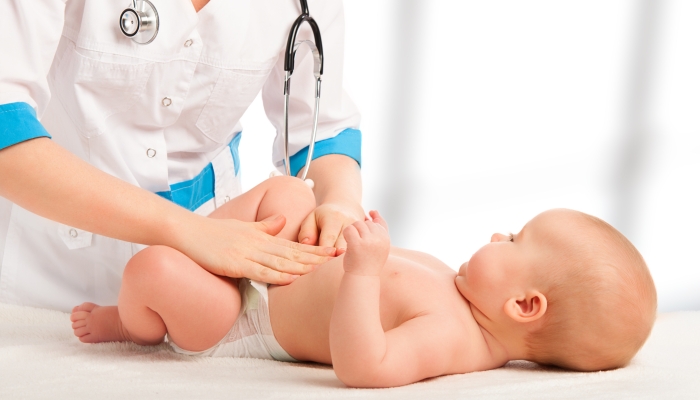
When to Worry if Your Newborn Farts a Lot
For the most part, baby gas is completely normal. However, there are a few things to be concerned about.
Pain
If your baby cries or seems uncomfortable in addition to their frequent gas, they may be having more serious tummy troubles. If you feel like you have tried all of the at home remedies without success, you may need to see your child’s pediatrician for help.
Constipation
Constipated babies are often more gassy than babies who are able to digest food properly and have regular bowel movements. If you suspect your baby is constipated, you can add a little bit of pear, apple, or prune juice to their bottle.
Vomiting and Diarrhea
If your baby has vomiting and/or diarrhea along with their excessive gas, they may have some kind of viral gastrointestinal illness or food poisoning.
In addition, if your baby has fevers or acts lethargic, they should be seen by a pediatrician.
Abdominal Bloating
If your baby’s belly seems more bloated than normal or if their stomach feels firm, it is best to take a trip to your pediatrician.
FAQs
Do breastfed babies fart more than formula-fed babies?
Breastfed babies tend to have less gas than formula-fed babies. If your baby drinks formula milk and has excessive gas, you may need to try several different brands to find one that works well for them.
Is it normal for my baby to cry while farting?
While all babies cry, it’s not normal for your baby to cry every time they fart. If your baby cries every time they fart or have a bowel movement, it may indicate a problem.
Do newborns eventually grow out of excessive farting?
Most newborns do eventually grow out of excessive farting. Gas in newborns tends to peak around 6 weeks of age, and tapers off between 3 and four months old.
How can I tell if my newborn’s gas is causing them significant discomfort?
Keeping a time log of your baby’s symptoms can help you determine what might be causing your baby discomfort. If your baby gets fussy right before passing gas or having a bowel movement, that’s a good sign that they are having tummy troubles.
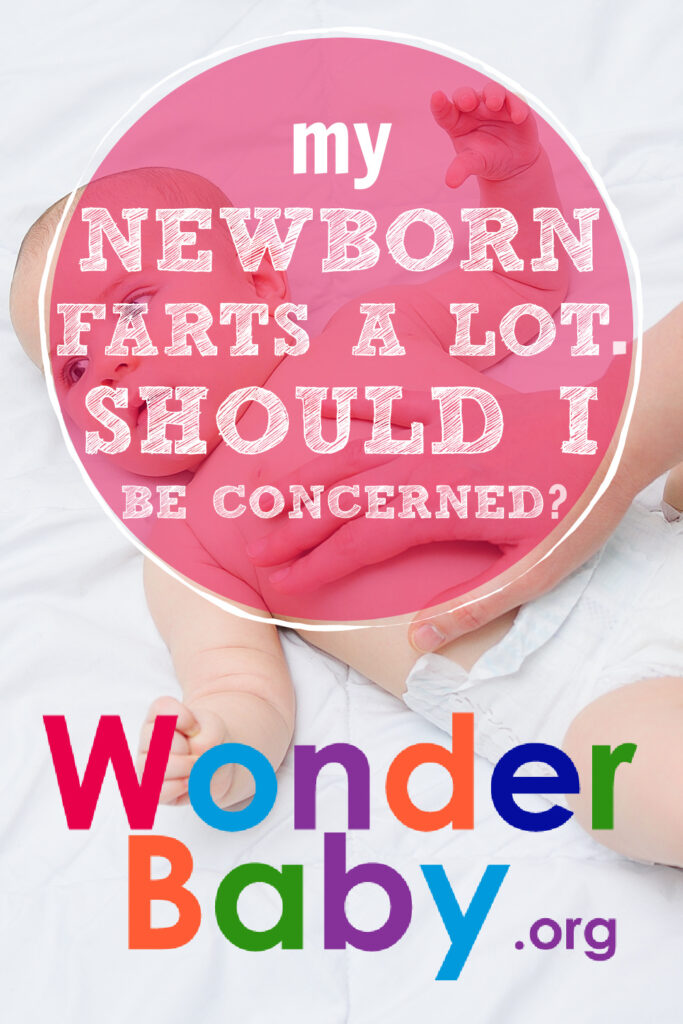
The information WonderBaby provides is not intended to be, and does not constitute, medical or other health advice or diagnosis and should not be used as such. Always consult with a qualified medical professional about your specific circumstances.
Related Posts

Health & Nutrition
Can Baby Skin Care Products Expire?
Is that forgotten tube of diaper rash cream still safe to use? Learn more about the expiration dates of popular skin care products for infants.

Health & Nutrition
Boosting Immunity in Kids: 3 Tips for a Healthy Winter
Parents can help boost their kids’ immunity during cold and flu season by maintaining healthy eating, sleeping, and exercising habits in the winter.
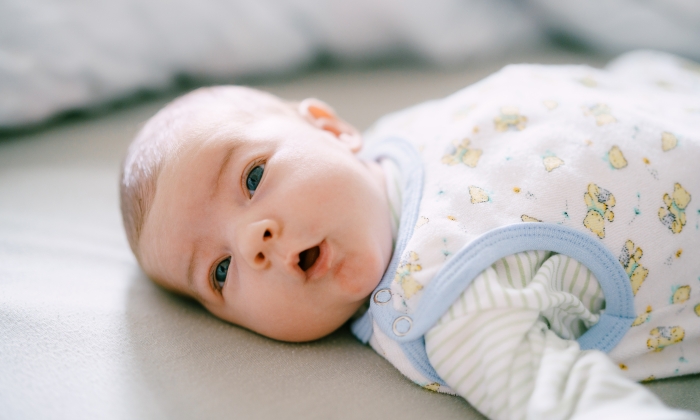
Health & Nutrition
Flat Head Syndrome and Torticollis: What You Should Know
Torticollis, or tight muscles in the neck, may cause your baby to have a flat spot on their head that needs to be assessed and treated by a physician.